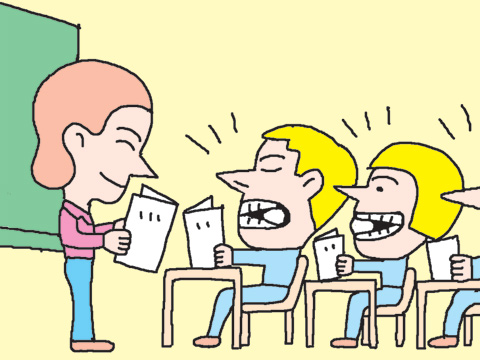수업시간에 껌 씹는 학생을 보는 것보다 더 교사를 화나게 하는(rile a teacher more than seeing a student chewing gum in class) 것은 없다.
그런데 독일 남부의 한 초등학교에선 수업시간에 껌을 씹으라고 적극 권장하고(actively encourage them to do so) 있다. 학업 성취도를 높이기 위한(in order to improve their academic achievements) 것이라고 한다.
이 새로운 실험 프로젝트(the new pilot project)가 진행되고 있는(be being run) 바이에른주(州) 폴켄슈완트초등학교의 한스 다슈 교장은 "껌을 씹는 것이 어린이들의 치아 건강에 좋을(be good for the children’s dental health) 뿐 아니라 인지력을 향상시키고(improve their cognitive performance) 집중력을 늘리는(increase concentration) 데도 도움이 된다"고 말한다.
"정신을 초롱초롱하게 하는(keep them alert) 뇌간의 두뇌 부위를 자극해(stimulate the part of the brain in the brainstem) 단어 기억 능력을 35%까지 높여준다는(boost the ability to recall words by up to 35%) 연구 결과도 있다"고 강조한다.
그에 따르면 학생들은 교사들과의 확실한 합의에 따라(according to a firm agreement with teachers) 말할 때를 제외하고는(except for when speaking) 입을 다물고 껌을 씹어야(must keep their mouths closed while chewing) 한다. 다 씹고 나서는 껌을 적절히 버리도록(properly dispose of the gum) 가르치고 있다.
이를 위해(to this end) 책상에는 벌, 무당벌레, 달팽이 등으로(with bees, ladybugs, snails and the like) 학생들 본인이 장식한 특수용기가 부착돼(be equipped with a special container decorated by the children themselves) 있다.
미군은 병사들의 집중력을 높이고 압박감 완화를 돕기 위해(boost soldiers’ concentration and help to relieve stress) 제1차 세계대전 이후 무료로 껌을 지급해오고(supply soldiers with free gum since the First World War) 있다.
